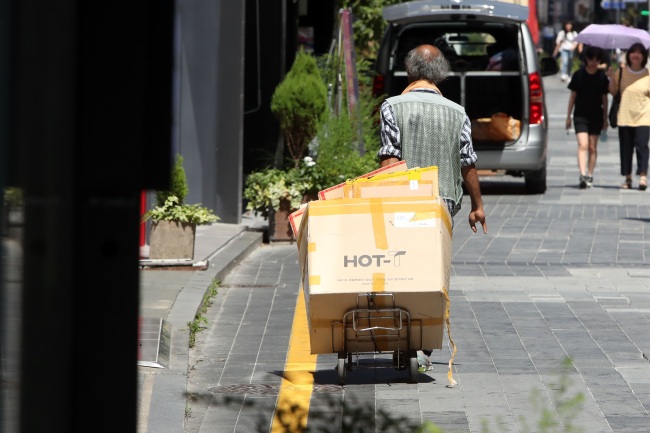The number of elderly South Koreans who have committed crimes increased dramatically, by 45 percent in the last five years, while 21.1 percent of the country’s elderly population is experiencing depression, police and government data has showed.
Rising elderly poverty rates, social isolation and mental health issues are being blamed for the surge in crime rates among the elderly -- defined as those aged 65 and older -- who account for 14 percent of the Korean population as of this year.
According to the reports, the number of elderly Koreans to have committed crimes increased from 77,260 in 2013 to 112,360 last year. The general crime rate, meanwhile, dropped in the same time period, from some 1,850,000 to 1,660,000.

Among all crimes, the number of serious crimes -- such as murder, rape and robbery -- committed by elderly Koreans increased 70 percent last year, from 1,062 in 2013 to 1,808. At the same time, the number of physical assaults committed by aging Koreans increased by 43.1 percent in the same period from 14,216 to 20,350.
Crime among the elderly has been on the rise since the late 2000s. In 2008, a man in his 60s set fire to Seoul’s historic gate Namdaemun, destroying the 550-year-old property and necessitating its eventual restoration.
In 2014, a man in his 60s was arrested for taking inappropriate sexual photographs of four elementary school girls in Yeongnam, South Jeolla Province. In 2015, a man in his 70s was arrested for raping his step-granddaughter.
In April this year, a 69-year-old woman was arrested after allegedly pouring pesticide into a pot of soup in an attempt to poison her neighbors in a small fishing village in Pohang, North Gyeongsang Province. In Incheon last month, a 75-year-old father stabbed his son to death.
Earlier this month, a 77-year-old man surnamed Kim fired a hunting rifle at a community center in Bonghwa, North Gyeongsang Province, killing two civil servants.
Poverty and social isolation have been repeatedly identified as serious problems among older Koreans. According to the Organization for Economic Cooperation and Development, about 50 percent of all aging Koreans live in relative poverty.
More than 80 percent of the Korean elderly also reportedly spend their leisure time solely watching TV, while 1.02 million out of 5.42 million senior citizens are reported to have been living alone as of 2016. According to the Ministry of Health and Welfare, 21 percent of all elderly Koreans have experienced depression.
Experts said the biggest reason behind the surging crime rate among the elderly had to do with the country’s aging population. Other major reasons -- poverty, isolation and depression -- are all intertwined, they said.
“Isolation is linked with criminal behaviors regardless of the offender’s age,” Lee Sue-jung, a professor of criminal psychology at Kyonggi University, told The Korea Herald.
“Many scholars believe that your support network and social (connections are) what makes a difference the minute a person is about to commit a crime. Those who have a family, those who have a job and those who are in school are more likely to have the self-control to stop when such a moment arises. It’s those who are completely isolated -- those who feel that they have nothing to lose, who feel that their criminal activities probably won’t affect anyone in their lives -- are more likely to lose control and go ahead with committing crimes.”

Such observations were also found in a study by professor Han Dong-hyo at International University of Korea. He found that elderly Koreans who are socially inactive or unemployed had a higher chance of committing crimes than those who are both socially and economically active.
“One of the ways to tackle elderly crime rates is to provide jobs for the elderly population,” he said. “This will help with the issue of isolation, which is linked to depression, on top of tackling poverty.”
One of the main reasons behind the elderly poverty in South Korea has to do with the flawed public pension system. The country first launched the program in 1988 but it did not become compulsory until the late 1990s.
Payouts depend on the amount and duration of pension premiums. Most of the elderly Koreans today were either unaware of the program or did not pay its premiums for the required 10 years while working. As a result, about 60 percent of all elderly, retired Koreans are currently not getting any payouts from the National Pension Service.
Kim Sun-tae, a retired teacher who now works as an elder rights activist, says he often feels misunderstood by the younger generation. “Whenever I talk about the importance of post-retirement public pension programs, many younger Koreans would accuse me of being selfish,” he told The Korea Herald.
“But it‘s not just about us. Everyone gets old one day, and everyone will have to retire from their jobs. If the government ignores our current concerns, the problems we face now will affect the future generations. Those in 20s and 30s really should start thinking about thier post-retirement plans, starting right now.”
(dyc@heraldcorp.com)


















![[Today’s K-pop] Treasure to publish magazine for debut anniversary](http://res.heraldm.com/phpwas/restmb_idxmake.php?idx=642&simg=/content/image/2024/07/26/20240726050551_0.jpg&u=)